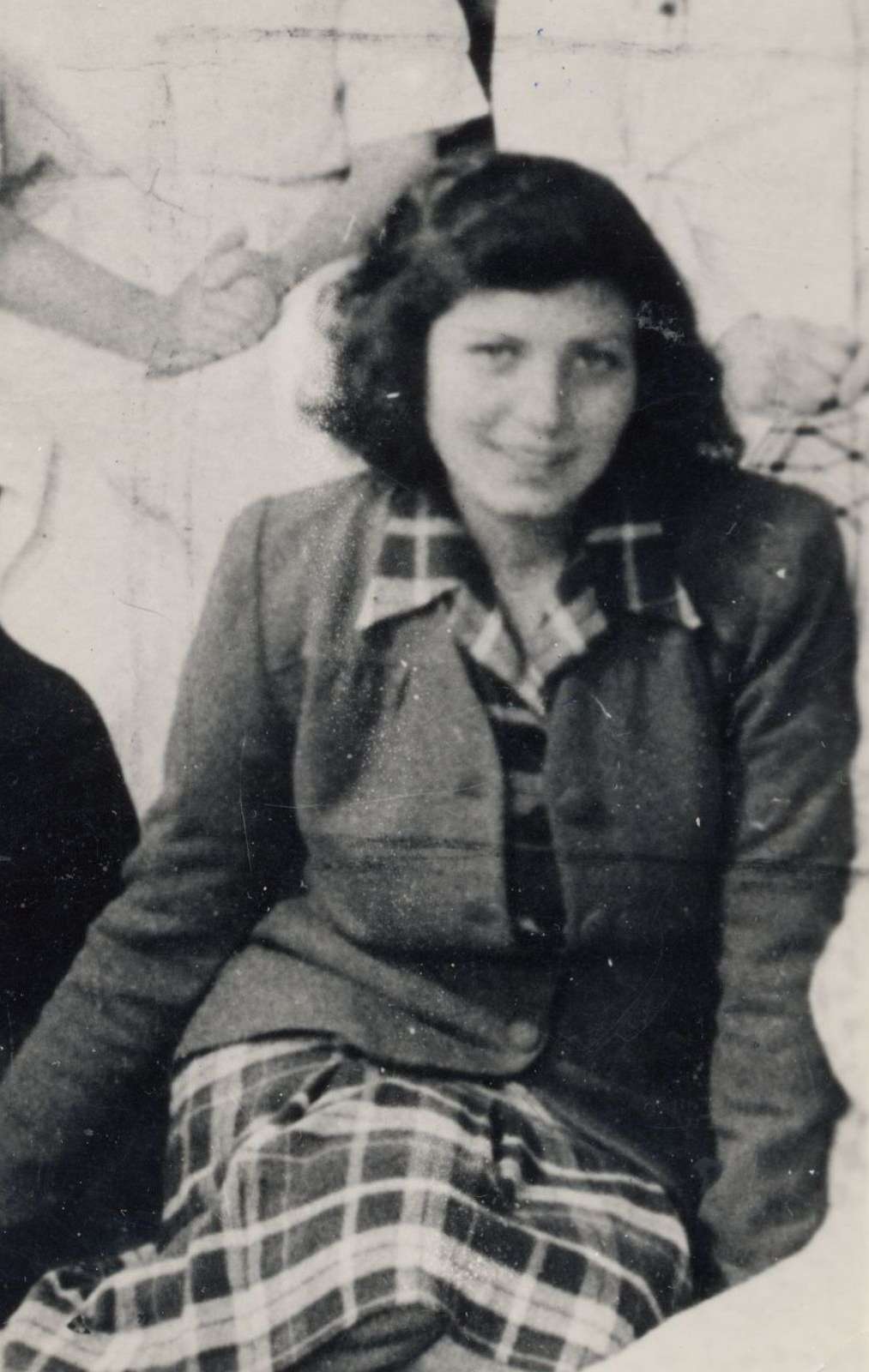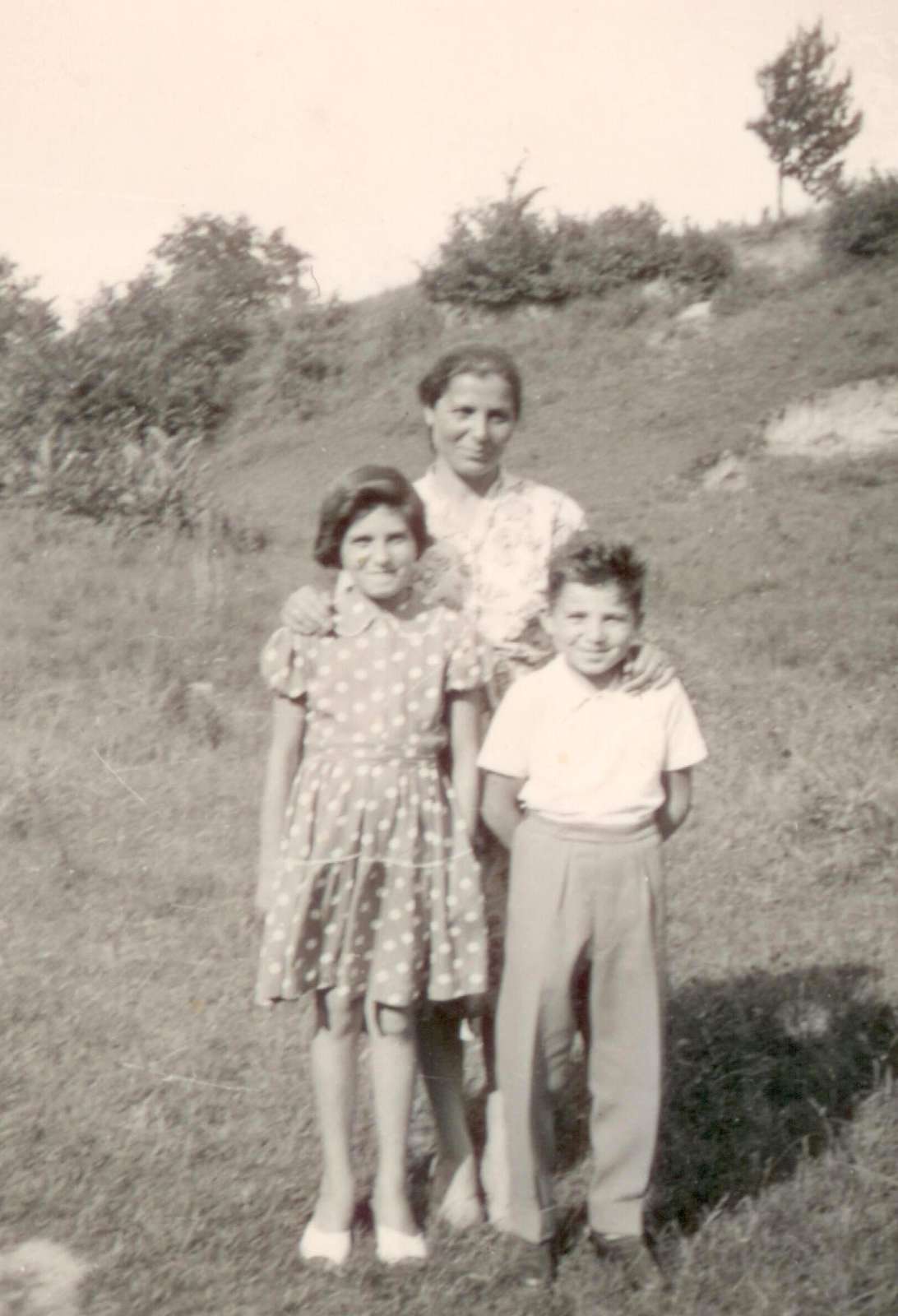Walpurga Horvath
... I stayed, I stayed alive
Walpurga Horvath was born on 15th November 1923 in Trausdorf in Burgenland. The Roma settlement there consisted of three houses in which she and her relatives lived.
Mrs. Horvath's father worked in road construction and in the quarry; in winter he made baskets for the farmers which Mrs. Horvath's mother exchanged for food in the villages. As they grew up, Walpurga Horvath and her seven siblings led a sheltered and carefree existence. But shortly after the "Anschluss" [1] of Austria, Walpurga and her sister Stefanie were deported to the concentration camp Ravensbrück, where they were imprisoned for six years. They lived to see the liberation, suffering badly from tuberculosis, in the concentration camp Bergen-Belsen.
The following excerpt from the life story of Mrs. Horvath was taken from an interview (conducted in Romany) from the contemporary witness documentation "Mri Historija. Life Stories of Burgenland Roma" by the association "Roma Service".
It was early in the morning when the SA came. We couldn't see much, you know? It was between 5 and 6 o'clock, because we were on our way to work. It might have even been 4 o'clock. […] We wanted to get dressed, go to work and collect our shears and the other things we needed and take them with us. "You don't need anything, go!" they said to us. […] They didn't even let us put on the aprons that we had with us. […] At that time, my parents happened to be at the house of my uncle, who lived in Großhöflein. They had nice houses there, they are still standing today. If you go down the High Street in Großhöflein you come to a hill, and that's where these houses are. The houses were bought by "Gadsche" [2]. My parents were arrested a year or two later and deported to Lackenbach [3]. […] My sister and my cousin Kathi were deported with me, we three from Trausdorf. […] That was on 25th June 1938. […]
And then we were in Eisenstadt, they rounded us up there, at the provincial government. There was a collection point there, and from there they took us by truck to Fischamend where we stayed the night. We were then deported to the camp in Ravensbrück on cattle wagons. When we arrived, all of the Sinti were already there, many, many Roma, so many women, the Yeniche, all together. […]
They crammed us all in [to the wagons] and drew across the bars, like when animals are transported. No water, nothing. And it was so hot! They didn't make any stops. And those who cried out for water had water thrown over them. […]
There [in Ravensbrück] we had to stand to attention, and from there we had to go into the "big bathroom". There was a large locker room, a dressing room they called it, for the prisoners' clothing – they took our clothes from us and our jewelry, my beautiful necklace from my [confirmation] sponsor. I had been confirmed two or three years earlier. And I had earrings from my mother, like little gemstones – "forget-me-not". I can still picture them today. They took them from me too. […] My mother and my family were sent to Lackenbach. They were sent to the camp one or two years later. […]
Then we were put into barracks. I was in "block 8". There was an "A-side" and a "B-side". There were 50 people. […] We had to dig the ground and make hills of earth. How can I describe it? We dug and made large hills. […] In the scorching, scorching heat, we weren't even given water. Those who collapsed were beaten, or bitten by dogs. […] Near Ravensbrück, there was a factory [an airplane factory]. We went to work early every morning, and in the evening we went home to the barracks, my God! They churned out airplanes, parachutes, military clothing there. I was in the sewing works. I had to sew trousers together and sew on buttons, 110 coats during the night. […]
There was a young girl there, they called her Kapa. She said to Paula, Paula Sarközi from Rudersdorf, "Auntie, are we in Vienna now?" She thought that she was in Vienna. Even then, we used to laugh when we were joking around and asked each other "Auntie, are we in Vienna now?" […] She was taken away. She was such a small, crippled girl. She was probably killed immediately. One time, I heard that there was a collection point for the mentally ill. They took them straight to the gas chambers from there. The old women too. We who worked and were able to work, they didn't let us die. […]
Shortly before the liberation, I was sent to Bergen-Belsen. […] It was hell there. In Ravensbrück, we no longer hoped to go home, we no longer hoped anything, you know? But there was still a small […] reason to live, because we worked. You worked – you did your work and got a little something [to eat]. But in Bergen-Belsen, we arrived in wooden clogs, there was still snow on the ground. I was already sick, and my sister and Pitscha from Margarethen dragged me along. They took me under my arms and walked with me, which wasn't actually allowed. If they had seen me, they would have shot me. And when the supervisor came, they let go of me and I was able to go a little way by myself. I arrived in Bergen-Belsen and I collapsed there. We were all half dead already. My sister could still stand and talk a little. Steffi was my savior. And then came the liberation. We were there for a week, no water, no bed, no food, nowhere to sit or to stand, the barracks had been burned down.
And when we arrived there, we saw from afar: "Now we can heat, it will be warm, there is wood!" There were mountains of wood. We thought it was wood. And do you know what it was? It was the dead. It was the dead: a layer of wood, a layer of corpses, and then the fir tree branches. They lit them with oil before our eyes. And when we saw this, it stank so badly, the dead reared up, like when you put a small chicken in the oven.
And then I became terribly ill, I just lay there. We had no hope left. And then I saw a soldier, regular soldier, not from the SS or the SA – they had already fled, they were gone. They stationed the poor soldiers there, the normal military. He was so young and he called down to us, "Girl", he must have been from Vienna, "girl, you're coughing so much!" And I thought, "I won't talk to him, he might only be talking to me so that he can shoot me". And so I went in [to the barracks], there were anyhow no beds, no doors. There was nothing but a burnt out ruin. He said, "Don't be afraid, today we will be free, today we will be free".
The woods weren't far away. It was surrounded by huge woods, like in Mauthausen. They always built concentration camps like that. And we heard bombardments and shooting. The tanks came right into the camps, the French and the Scottish, and we said, "Yay, they are wearing skirts!" We didn't know their uniform. It was the British who freed us. One more hour, and I wouldn't be here today. […] You should have seen how quickly they put up their tents. There were people there giving injections, they were only giving injections, for there was nothing to eat and no one could have eaten anyway, everyone was just lying around. Except for my sister and this one girl from St. Margarethen. And the beautiful girls, oh Koki from Bernstein, such a beautiful girl with such beautiful, long, blond hair, she died on that day. Koki. Rosl, Rosalia was her real name. Oh woe!
They took us away from there; they took us to SS homes, they made hospitals, emergency hospitals. There were beds there, three beds in each room. I lay in the middle. And every day they brought children left and right of me. As if God was watching over me. I stayed, I stayed alive.
The Hungarian soldier said "Wali" – he couldn't pronounce Walpurga – "Wali, they went home" when the children died.
"Why can't I go home?"
"No, Wali, you are staying with me!"
And then I cried and said, "My sister is dead too, my sister is dead."
But she wasn't dead. She was just in different barracks because she was healthier. She was in a home, in little settlements with those who were healthier. We were infectious – we had tuberculosis and other diseases. […] The Hungarian soldier told me that my sister Steffi was alive. How did he know that?
"She's wearing a red blouse and looks down. She's looking for you."
"Well then, if you see her, tell her that I am alive and that I'm here."
"I always tell her, but she's not allowed to come here."
And he always comforted me with this when I cried. […] She had thought that I was already dead and had been going from mass grave to mass grave laying flowers that she had picked from the fields.
She kept saying, "My sister is dead! My sister's not alive anymore!"
And the doctors said to her, "Here is your sister!" When we were reunited, what joy! We were so happy.
Miraculously, with the exception of a brother and a niece, her whole family survived their incarceration in concentration camps. After Walpurga and her sister Stefanie had spent a year and a half recovering in Sweden, they returned to Austria in 1947. Walpurga and her family were allocated a room in the municipal house in Trausdorf, as all of the houses had been destroyed.
When we returned home, it was wonderful for us, truly wonderful. […] The sadness was gone – home is home. Home is home, even if it is just a hut. Only love, human love counts – financial love, material love, didn't interest us. Although we were happy that we had something to wear and something to eat, the mental scars were never healed. We were constantly ill, psychologically ill. It still hasn't gone away, believe me, I carry it with me always, always.
First publication of this article in: Renate S. Meissner on behalf of the National Fund (Ed.): Lives Remembered. Life Stories of Victims of National Socialism. Vienna, 2010, pages 250-256.



